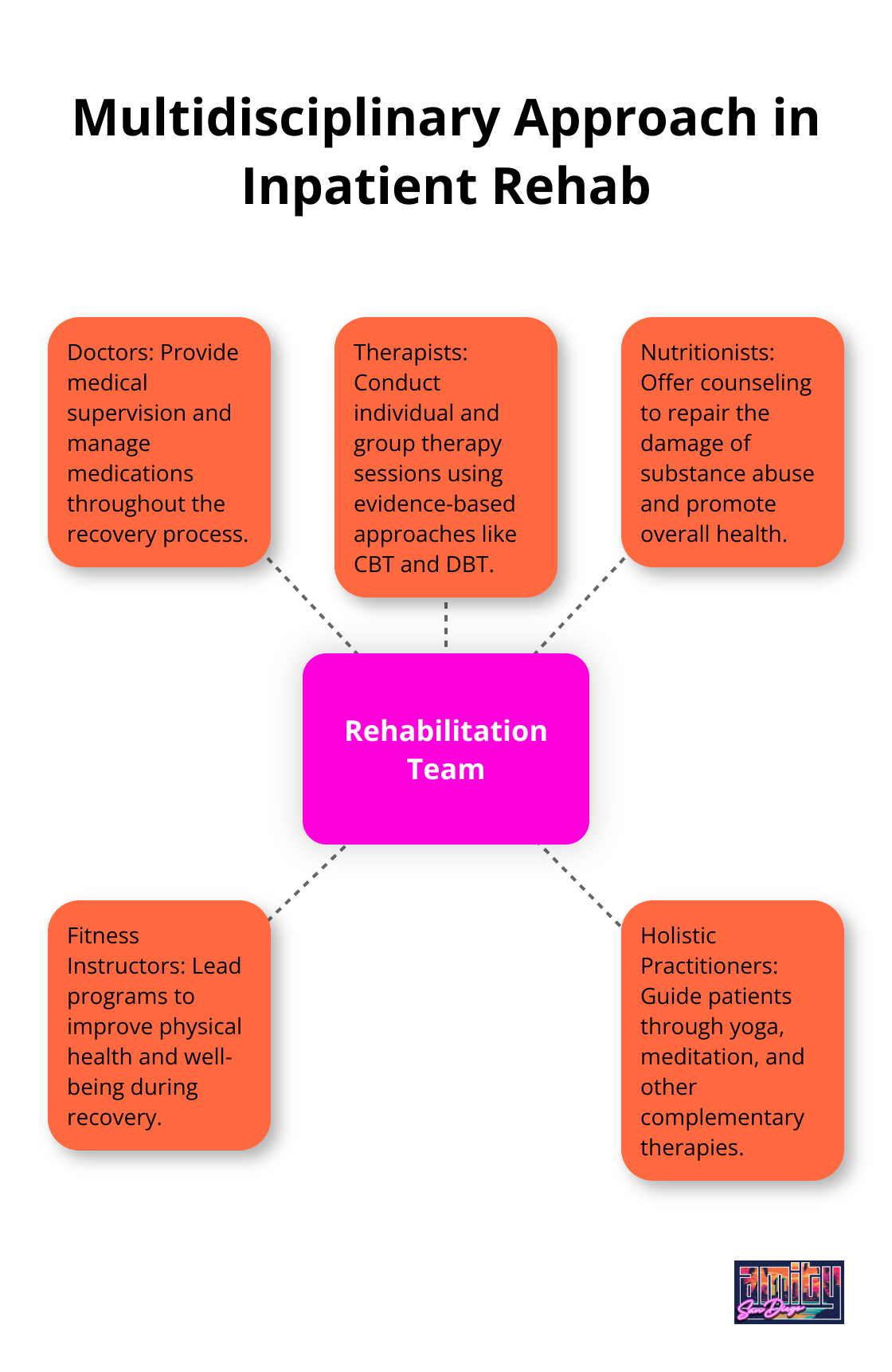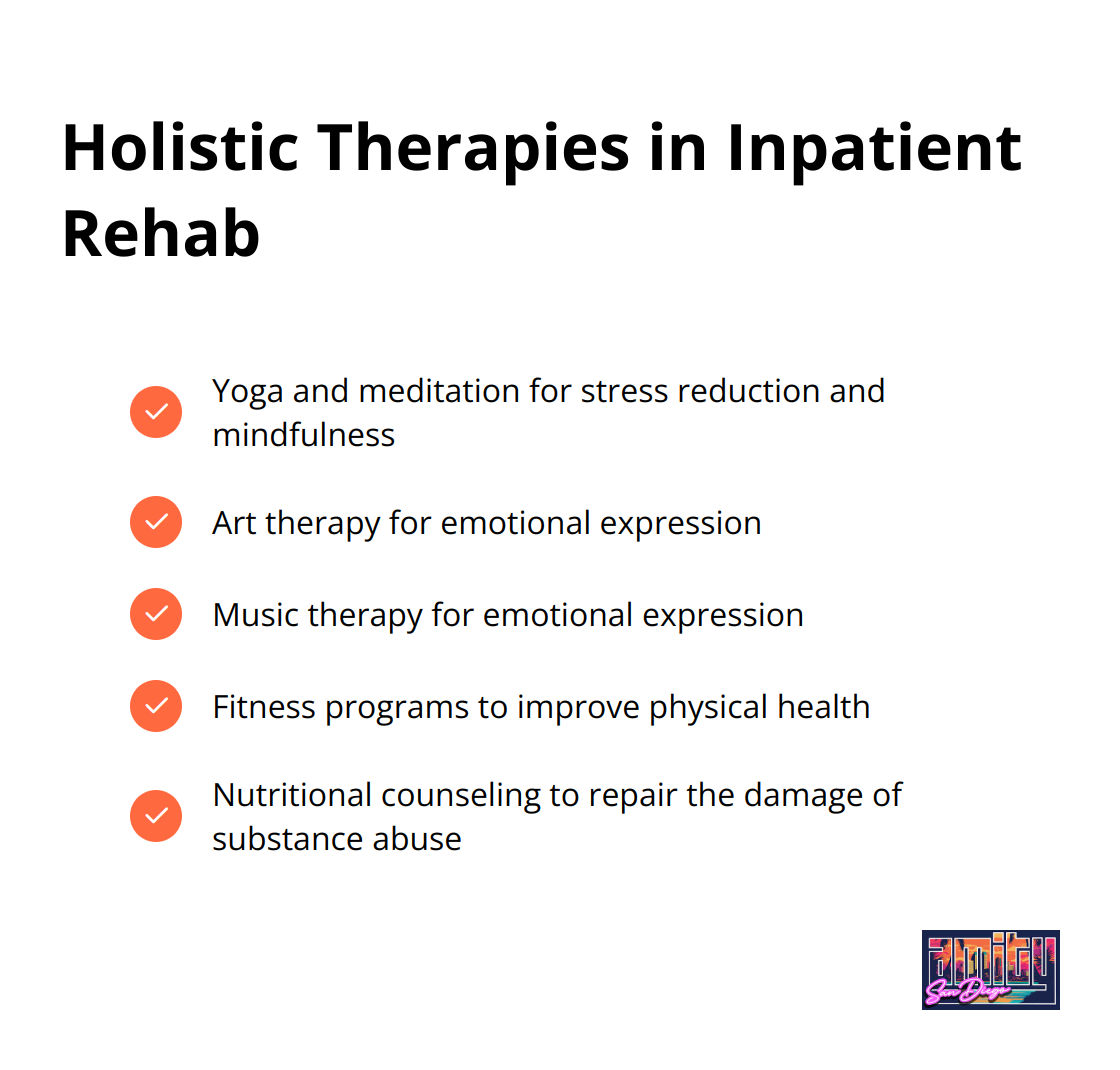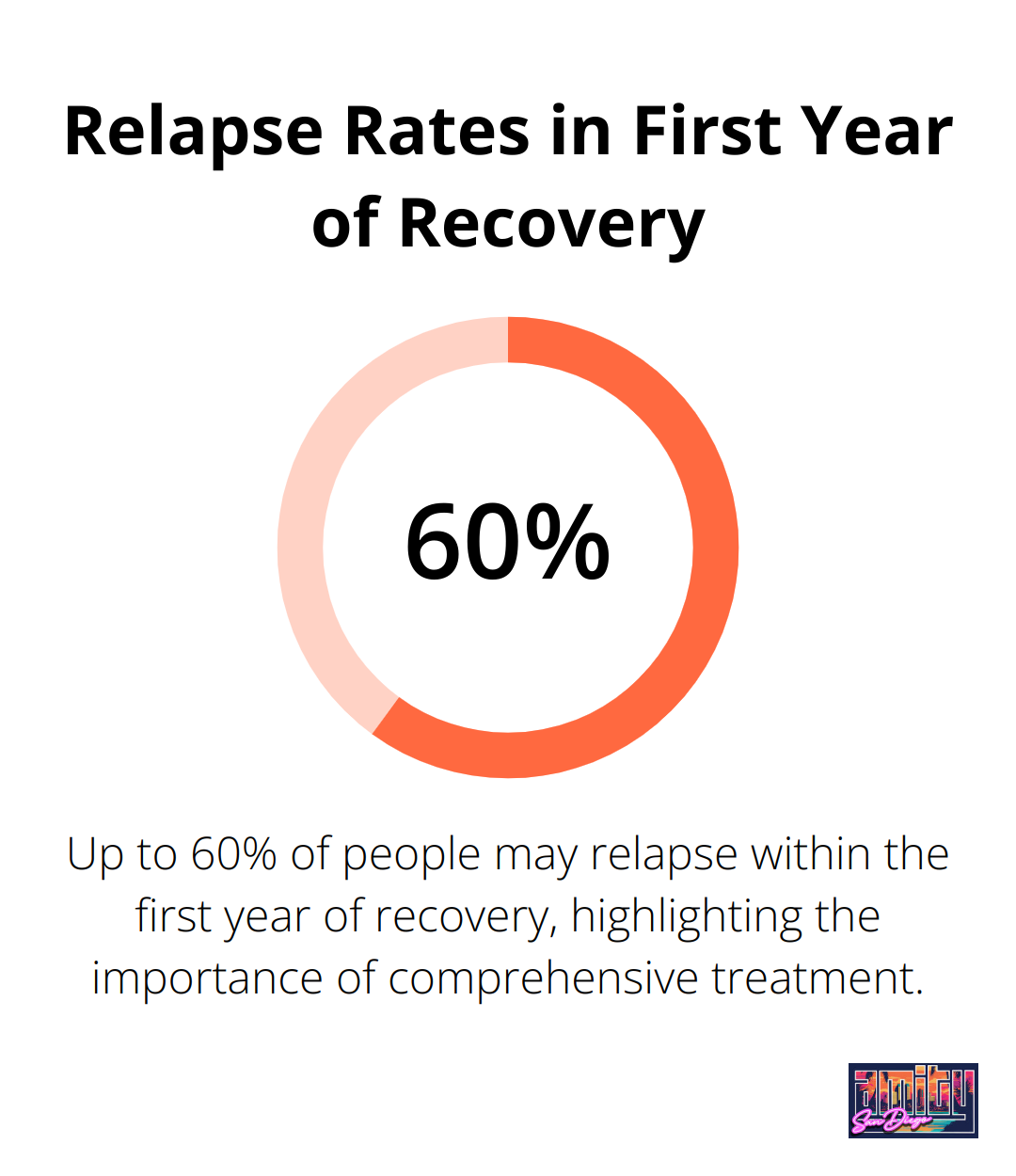Addiction can be a relentless enemy, but there’s hope for those seeking lasting recovery. At Amity San Diego, we’ve seen firsthand how inpatient rehab offers a comprehensive path to healing.
This intensive approach provides the structure, support, and tools needed to break free from substance abuse. In this post, we’ll explore why inpatient rehab is often the most effective choice for those committed to reclaiming their lives.
What Makes Inpatient Rehab So Effective?
Inpatient rehab offers a powerful combination of round-the-clock care, structure, and comprehensive treatment that sets it apart from other recovery options. This intensive approach can transform the lives of those struggling with addiction.
24/7 Medical Support: A Safety Net for Recovery
One of the most important aspects of inpatient rehab is the constant medical supervision. Inpatient detox is often the first step in the recovery process, involving medically supervised withdrawal from substances. This level of care is especially important during the early stages of recovery when withdrawal symptoms can be severe (and potentially life-threatening). Medical professionals stand ready to manage symptoms, adjust medications, and respond to any emergencies that may arise.
A Structured Environment: The Foundation for Healing
Inpatient rehab programs provide a highly structured environment that removes the distractions and triggers of everyday life. This structure creates a safe space where patients can focus entirely on their recovery. A typical day in inpatient rehab might include individual therapy sessions, group meetings, educational workshops, and holistic activities (like yoga or meditation).
Multidisciplinary Approach: Addressing All Aspects of Addiction
Effective inpatient rehab programs employ a multidisciplinary approach to treatment. This means that patients have access to a rehabilitation team, a group of healthcare professionals with distinct training and backgrounds who collaborate with each other to help the patient. Each team member brings their unique expertise to create a comprehensive treatment plan that addresses not just the addiction itself, but also any underlying mental health issues, physical health concerns, and lifestyle factors that may contribute to substance abuse.

Intensive, Immersive Healing
The intensive, immersive nature of inpatient treatment allows for deep healing and the development of crucial coping skills that can support a lifetime of sobriety. While inpatient rehab can be a significant commitment of time and resources, it often provides the best chance for long-term recovery.
Choosing the Right Inpatient Program
It’s important to choose a facility that aligns with your specific needs and recovery goals. Try to find programs that offer evidence-based treatments, have a strong track record of success, and provide a supportive, non-judgmental environment.
The comprehensive nature of inpatient rehab sets the stage for lasting recovery. But what exactly happens during these programs? Let’s explore the key components that make inpatient rehab so effective.
What Happens in Inpatient Rehab
Inpatient rehab provides a comprehensive journey towards recovery. At Amity San Diego, we design our programs to address every aspect of addiction and provide the tools needed for lasting sobriety. Let’s explore the key components that make inpatient rehab effective.
Medically Supervised Detoxification
The first step in many inpatient programs is detoxification. This process can challenge patients and potentially endanger their health, which necessitates medical supervision. Medically supervised detoxification can be completed safely and effectively in both inpatient and outpatient treatment settings.
During detox, medical professionals monitor patients 24/7 to manage withdrawal symptoms and ensure safety. This might include medication-assisted treatment (MAT) to ease discomfort and reduce cravings. The process creates a foundation for the therapeutic work to come.
Intensive Therapy: Individual and Group Sessions
After detox completion, patients start their core recovery work through therapy. Individual sessions allow for personalized attention to specific issues, traumas, and triggers. Trained therapists often use evidence-based approaches like Cognitive Behavioral Therapy (CBT) or Dialectical Behavior Therapy (DBT) in these one-on-one meetings.
Group therapy sessions hold equal importance. They provide peer support, reduce feelings of isolation, and allow patients to practice new communication skills.
Holistic Healing Approaches
Inpatient rehab addresses more than just the addiction itself – it heals the whole person. Many programs incorporate holistic therapies to support overall well-being. These might include:

Life Skills and Relapse Prevention
Preparation for life after rehab forms a critical component of inpatient treatment. Patients learn essential life skills (financial management, job readiness, and healthy coping mechanisms). These practical tools help build a strong foundation for long-term recovery.
Relapse prevention education holds equal importance. Patients learn to identify their personal triggers, develop strategies to manage cravings, and create a support network for when they return home. Addiction treatment can be effective, and assessing a program’s efficacy is important in determining its success.
Inpatient rehab offers a unique opportunity for intensive, focused healing. The combination of medical care, therapy, holistic approaches, and practical life skills provides a comprehensive path to recovery. This structured environment and constant support create ideal conditions for lasting change. As we move forward, let’s explore the specific benefits that make inpatient rehab stand out from other treatment options.
Why Choose Inpatient Rehab?
Inpatient rehab offers unique advantages that can significantly boost your chances of long-term recovery. Let’s explore the key benefits that make inpatient rehab stand out.
A Safe Haven from Triggers
Inpatient rehab removes you completely from your usual environment. This separation creates a buffer between you and the people, places, and situations that might trigger substance use. A study by NIDA found that 40-60% of people relapse within their first year of recovery. However, inpatient programs can dramatically reduce this risk by providing a controlled, substance-free environment during the critical early stages of recovery.

Building a Recovery Community
Inpatient rehab fosters a sense of community that’s hard to replicate in other settings. You surround yourself with peers who understand your struggles and work towards similar goals. This peer support can be incredibly powerful. Research shows that strong social support in recovery correlates with better outcomes and reduced relapse rates.
Intensive Focus on Healing
The immersive nature of inpatient rehab allows for deep, focused work on your recovery. Without the distractions of daily life, you can dedicate yourself fully to healing. This concentrated time for self-reflection and personal growth is invaluable. Many individuals report that this period of intensive focus helps them break long-standing patterns and develop new, healthier coping mechanisms.
Higher Success Rates
While individual results vary, statistics consistently show that inpatient rehab tends to have higher success rates compared to outpatient treatment. A study found that longer durations in treatment correlate with reduced relapse rates.
Comprehensive Medical Support
Inpatient rehab provides round-the-clock medical care, which is especially important during the early stages of recovery. Medical professionals (including doctors and nurses) monitor your progress, manage withdrawal symptoms, and address any health complications that may arise. This level of care ensures your safety and comfort throughout the treatment process.
For those transitioning from inpatient rehabilitation or dealing with milder forms of addiction, outpatient treatment can also be an effective option.
Final Thoughts
Inpatient rehab transforms lives through comprehensive addiction recovery. The combination of constant medical supervision, structured environments, and multidisciplinary treatment creates an ideal setting for healing. This thorough approach leads to higher success rates compared to outpatient options, allowing for deep healing and the development of essential coping skills.
Selecting the right treatment program plays a vital role in recovery success. We recommend finding a facility that offers evidence-based treatments, demonstrates a strong track record, and provides a supportive environment. At Amity San Diego, we combine clinical excellence with compassionate care to empower individuals on their journey to recovery.
Taking the first step towards recovery requires courage, but inpatient rehab provides the structure and tools needed to break free from addiction. Recovery is possible, and you don’t have to face this challenge alone. If you or a loved one struggles with addiction, reach out for help today to start your path to a healthier future.

